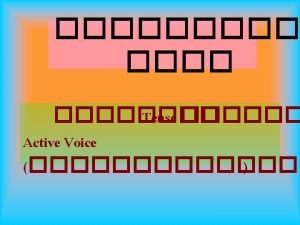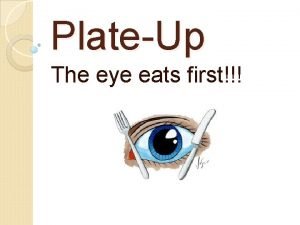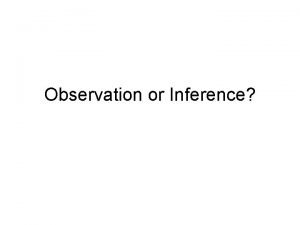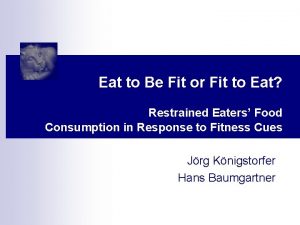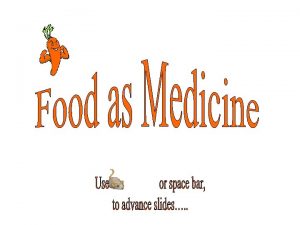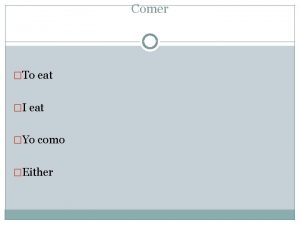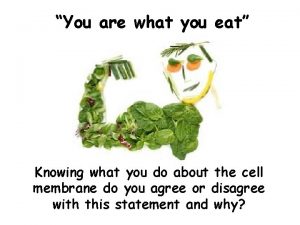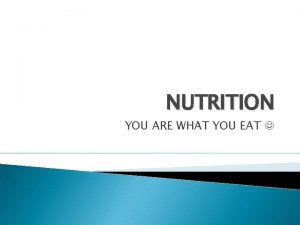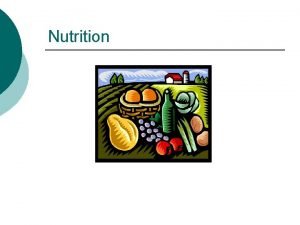You are what you eat What are we


























- Slides: 26

You are what you eat?

What are we made of? • • • Water Minerals Protein Fat Carbohydrate (Glycogen)

Today we are going to learn about: • Body Weight vs. Body Composition • How to achieve a healthy weight. • What nutrients are. • How many calories we burn daily.

Why do we have concerns about healthy body weight? • Obsession with thinness and unrealistic body shapes. • More people are overweight then ever before.

Why do we have concerns about healthy body weight? • Surgical Complications • Breathing Difficulties • Type 2 Diabetes • High Blood pressure • Stroke • Heart Attack • Heart Disease • • Gallstones Skin Disorders Cancer Bone and Joint Problems • Complications to Pregnancy

What is a healthy weight? • Is there one perfect weight for each height? Why or Why not? • How can you know if you are at a healthy weight? • Can you use a height weight chart?

Height – Weight Tables • Developed in 1940’s by INSURANCE companies. • Based solely on mortality statistics. – Fatter people = increased risk of death • Do not take into account body composition!!!

Body Mass Index • BMI = Weight (kg) / Height (m) 2 • Desirable – Men: 21. 9 – 22. 4 – Women: 21. 3 – 22. 1 – Over weight: 25 - 30 – Obese: >30

Body Mass Index • BMI’s above 27 are associated with incidence of hypertension, diabetes, & CHD. • Still used frequently by doctors and researchers. • Does not take body composition into account.

Body Mass Index • Height: 5’ 10” = 1. 77 m • Weight: 221 lbs = 100. 45 kg • BMI = 32. 09 • THIS GUY IS OBESE !!!!

Assessing Body Composition • Direct • Indirect – Estimating body composition • Hydrostatic weighing • Skinfold measurements • Girth measurements • Bioelectric Impedance

Body Composition • Human body made up of: –Water –Protein (muscle) –Fat –Bone

Reference Man / Woman • Developed by Albert Behnke, M. D. • A theoretical model based on an “average” person. • Divides body into: – Lean Body Mass • Protein and Bone – Fat • Essential • Non-essential or storage

Average Person/Reference Male • 15% Fat • 45% Muscle • 15% Bone • 25% Other • Female • • 27% Fat 36% Muscle 12% Bone 25% Other

What is a healthy percent of body fat for men and woman? • Males 15% • Females 25%

Body weight is meaningless if: • You do not know what it is made up of (lean vs. fat) • Where the fat is located on your body • How fit and healthy you are.

Energy Balance • Energy in = Energy Out Body weight is maintained. • Energy in is GREATER than Energy Out Body weight is GAINED. • Energy in is LESS then Energy Out Body weight is LOST.

What Provides Energy? • Carbohydrate • Fat • Protein

How do we measure energy? Calories The amount of energy required to raise one gram of water one degree Celsius.

Calorimeter

How much energy is in food? • 1 g of carbohydrate has 4 calories • 1 g of protein has 4 calories • 1 g of fat has 9 calories

How does our body use energy? • Basal Metabolism • Physical Activity • Thermic Effect of Food

Calculating Your Basal Metabolic Rate Women: BMR = 655 + ( 4. 35 x weight in pounds ) + ( 4. 7 x height in inches ) - ( 4. 7 x age in years ) Women: BMR = 655 + ( 4. 35 x _____) + ( 4. 7 x______) - ( 4. 7 x _______) Women: BMR = 655 + ( ________ ) + ( ________) - ( _______) Women: BMR = Men: BMR = 66 + ( 6. 23 x weight in pounds ) + ( 12. 7 x height in inches ) - ( 6. 8 x age in year ) Men: BMR = 66 + ( 6. 23 x________) + ( 12. 7 x _______) - ( 6. 8 x_____) Men: BMR = 66 + ( __________) + ( _________) - (_______) Men: BMR =

Harris Benedict Formula • To determine your total daily calorie needs, multiply your BMR by the appropriate activity factor, as follows: • If you are sedentary (little or no exercise) : Calorie-Calculation = BMR x 1. 2 • If you are lightly active (light exercise/sports 1 -3 days/week) : Calorie. Calculation = BMR x 1. 375 • If you are moderately active (moderate exercise/sports 3 -5 days/week) : Calorie-Calculation = BMR x 1. 55 • If you are very active (hard exercise/sports 6 -7 days a week) : Calorie. Calculation = BMR x 1. 725 • If you are extra active (very hard exercise/sports & physical job or 2 x training) : Calorie-Calculation = BMR x 1. 9

What type of things effect our basal metabolism? • • Growth? Male ? Female? Lean Body Mass? Age? Pregnancy Fever? Dieting? • Caffeine? • Smoking?

What is a healthy weight? • If you are eating healthfully, being active, getting adequate rest, and have good mental and physical health, your body most likely has a healthy proportion and distribution of body fat, meaning you are at a “healthy weight, ” regardless of the number on the scale.
 Insidan region jh
Insidan region jh I eat, you eat, he eats
I eat, you eat, he eats I would rather eat potatoes than eat rice yay or nay
I would rather eat potatoes than eat rice yay or nay People buy me to eat but never eat me what am i
People buy me to eat but never eat me what am i Agree or disagree questions about life
Agree or disagree questions about life Tell me what you eat and i shall tell you what you are
Tell me what you eat and i shall tell you what you are You eat what you touch
You eat what you touch Victory in jesus images
Victory in jesus images Macromolecules you are what you eat
Macromolecules you are what you eat You are what you eat macromolecules
You are what you eat macromolecules The digestive system you are what you eat worksheet answers
The digestive system you are what you eat worksheet answers Describe mayella's injuries
Describe mayella's injuries What do you like to eat
What do you like to eat The eyes eats first
The eyes eats first Are sewer lice edible
Are sewer lice edible جواب what's your favorite food
جواب what's your favorite food You eat with your eyes first
You eat with your eyes first What do you like to eat
What do you like to eat You mustn't smoke in the hospital
You mustn't smoke in the hospital Eat sleep console scoring sheet
Eat sleep console scoring sheet Rich tudor food
Rich tudor food Touching spirit bear chapter 1
Touching spirit bear chapter 1 How do euglena eat
How do euglena eat Fish eating krill
Fish eating krill The life cycle of a snow leopard
The life cycle of a snow leopard Kumeyaay baskets
Kumeyaay baskets Pelican eel habitat
Pelican eel habitat

